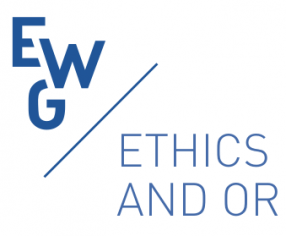Operational Research (OR) is the discipline of applying advanced analytical methods to help make better decisions – in businesses as well as in societies. By using techniques such as problem definition and problem structuring methods as well as mathematical modelling to analyze complex situations, OR allows to make more effective decisions and to build more productive and safer systems.
The OR and Ethics EURO Working group is dealing with ethical dimensions of OR. By ethics we understand moral, (descriptive) normative, political principles, regimes and structures. Therefore, the group is particularly focused on using OR for the “common good”, to “make an impact”, and to address societal challenges.
History:
The EURO Working Group on ‘Ethics and OR’ was founded in 2001 at the EURO XVIII Conference in Rotterdam. At this conference, the new EWG organised some sessions in co-operation with the EWG on Human Centered Processes.
It is during the EURO XVII CONFERENCE – July 16-19, 2000 in Budapest (Hungary) that Professor J.P. Brans of the Vrije Universiteit Brussel held his opening lecture on ‘OR, Ethics and Decision’ and proposed the ‘Oath of Prometheus’. One year later, this resulted in the formation of the EURO Working Group on ‘Ethics and OR’.
Previous activities of the EURO Working group after its foundation 2002-2012
A stream “OR and Ethics” with 8 presentations was organized for the EURO 25 conference at Vilnius, 2012. A workshop on the state of the art was organised by Dorien DeTombe, Cathal Brugha, Gerhard–Wilhelm Weber and Fred Wenstøp.
A stream “OR and Ethics” was organised by Leroy White at the IFORS 2011 International Conference in Melbourne (2011)
“International Conference on Complexity, Uncertainty and Ethics” was organised by Erik Pruyt at Delft (The Netherlands) (2011).
A stream on “Ethics and OR” organized by Cristóbal Miralles for the ICOVACS 2010 (International Conference on Value Chain Sustainability) in Valencia (2010)
A stream on “OR in Life Sciences and Education – Trends, History and Ethics” organized by Gerhard Wilhelm Weber at the International Conference on Operations Research OR2010 at Munich. September 1-3, 2010.
A workshop on the state of the art in connection with EURO XXIV in Lisbon (Portugal) was organized by Dorien DeTombe, Cathal Brugha, Gerhard–Wilhelm Weber and Fred Wenstøp (2010) A stream “OR and Ethics” with 8 presentations was organised.
A main stream on OR education, history & ethics at EURO 23 in Bonn (2009) was organized with a substream of two sessions on OR and ethics.
Jean-Pierre Brans, the founding father of the EWG Ethics in OR organized a workshop ‘Ethics in Decision-Making’ during the Human Centered Processes (HCP) conference TU-Delft, The Netherlands (2008).
A main stream was organized on OR and ethics at the EURO 22 in Prague (2008), as well as a working group meeting.
OR and ethics stream at IFORS 18th Triennial Conference of the International Federation of Operational Research Societies IFORS 2007
A stream on OR and Ethics was organized at EURO 2006, Reykjavik
EWG WORKSHOP ON ‘PROMOTING ETHICS IN OR’ – April 25-26, 2003 – INSEAD, FONTAINEBLEAU, FRANCE:
Luk Van Wassenhove and Marc Le Menestrel hosted the highly succesful two-day INSEAD workshop on ‘Promoting Ethics in OR’, sponsored by the INSEAD R&D department, at the INSEAD campus in Fontainebleau. At this workshop, senior Operational Research scholars and ethical experts joined forces to synthesize the state-of-the-art of ‘Ethics and Operational Research’ at the theoretical, practical and institutional levels. Short papers were presented and discussions moderated in three parallel workshops, followed by synthesis, discussion and brainstorming in plenary sessions. Furthermore, avenues of research as well as practical and institutional actions aimed at favoring the integration of Ethics and Operational Research were developed.
12th MINI EURO CONFERENCE – April 2-5, 2002 – VRIJE UNIVERSITEIT BRUSSEL, BRUSSELS, BELGIUM.
Just after its foundation the working group actively participated in the organisation with the themes Decision Support Systems, E- and M-Commerce, Multicriteria Decision Aid, Human-Centered Processes and, last but not least, Ethical Dilemmas in Decision Making. Many interesting papers on Ethics and OR were presented (some of them have been published in a special issue of EJOR).


